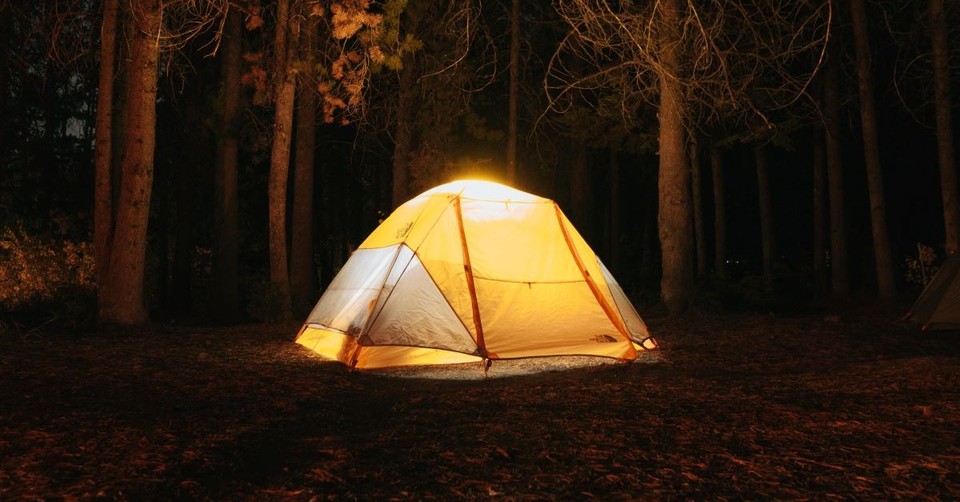3 Biblical Images of Shelter on Our Spiritual Journeys

We covered 4,728 miles on a family road trip from our home in Michigan to Yellowstone National Park in Wyoming, and back again. Along the way, we sang along to classic road trip songs, played a lot of car games (we successfully located all 50 state license plates), and watched the changing landscape outside our windows.
While I anticipated that we would be excited to see the majestic scenery and wildlife, I was surprised that the more mundane also captured my attention – all the different types of accommodations or shelters.
Shelter. It’s the generic term for something that offers protection from the elements. I don’t usually spend much time thinking about shelter, but there was something about the unique ways that people take shelter while traveling that intrigued me. From massive RVs bigger than my first apartment to hikers walking with all their supplies on their backs, shelter often looks different when traveling.
Because the spiritual life is often pictured as a journey, it wasn’t long before I started reflecting on familiar Bible passages that use words or images for shelter. Even if your summer plans keep you closer to home, I hope the following three passages that remind us of our current and future places of rest and shelter are an encouragement to you.
1. Biblical Image of a Hiding Place
You are my hiding place;
you will protect me from trouble
and surround me with songs of deliverance. Psalm 32:7
Before heading out on a long hike at Yellowstone National Park, we found ourselves facing the confusing reality of wanting to be prepared for any situation and having to carry all our supplies on our backs. Do we really need the weight of bear spray (a definite yes) or a change of shoes if it gets muddy (they stayed in the car)? Despite checking the weather conditions and carrying supplies with us, the unexpected can still happen. As we hiked, we noticed places under a rocky cliff or natural overhang where we could stop and rest. Many of those natural shelters looked like they had served as emergency havens during unexpected storms.
In the book of Psalms, David beautifully expresses praise to the Lord but he also cries out to God in times of trouble. While it is unclear the specific background to Psalm 32, the imagery draws on David’s experiences living in the caves and wilderness of Israel. In Psalm 32:7, he describes God as his “hiding place.” A hiding place is a very basic type of shelter, a place of covering or protection often associated with a place in nature. When unexpected trouble arises for David, he runs to find shelter in God.
Despite all our planning, there are many things in life we are never prepared for. A car accident, a health emergency, the sudden death of a loved one, the loss of a job. In those moments when we find ourselves caught in a storm without the time or energy to find or build shelter, God wants to be our hiding place and offer us his mighty protection even as the storm rages. It is only under his care that we find protection from the chaos of the storm and comfort to rest until we can continue on our journey.
2. Biblical Image of a Tent
For we know that if the earthly tent we live in is destroyed, we have a building from God, an eternal house in heaven, not built by human hands. Meanwhile we groan, longing to be clothed instead with our heavenly dwelling. 2 Corinthians 5:1-2
A common shelter in the campgrounds we stayed in were tents but they took many different forms. Some were so small that I was surprised an adult could rest comfortably. Others spread out and featured multiple rooms. Regardless of their size, it took time and planning to set up the tents. One of my favorite t-shirts I saw in a souvenir shop said, “Sorry for what I said when we set up the tent.” The benefit of sleeping in a tent does not eliminate the frustration of having to set up and take down a tent!
Biblical tents were similar to our modern tents, usually made of cloth or animal skins stretched from poles to stakes in the ground as pictured in Isaiah 54:2 (“Enlarge the place of your tent…lengthen your cords, strengthen your stakes.”). While Old Testament patriarchs like Abraham likely lived their entire lives in tents, most tents in the Bible tended to be temporary shelters used until more permanent structures could be built. The nation of Israel lived in tents from the time they left Egypt until they settled in Israel. I can only imagine how relieved they were to finally be done setting up and taking down tents as they traveled.
In the New Testament, Paul draws upon the idea of tents as temporary accommodation to remind us of an important truth about our physical bodies. Like tents, our bodies are not intended to be permanent and over time we experience the frustration of caring for aging bodies. Deteriorating joints need to be replaced, our muscles grow weaker and it becomes more difficult to fight off disease. Paul’s use of a tent metaphor points to the reality that our journeys on earth are brief and that our bodies are vulnerable.
While tents seemed popular for adventurous travelers, I imagine very few of them make tents their permanent homes. In a similar way, while our bodies are an amazing gift from God, Paul reminds us that our physical bodies are not intended to be permanent. Instead, he points us to the hope we have of a permanent, eternal home that Jesus promised awaits us in heaven.
3. Biblical Image of Our Home
My Father’s house has many rooms; if that were not so, would I have told you that I am going there to prepare a place for you? And if I go and prepare a place for you, I will come back and take you to be with me that you also may be where I am. John 14:2, 3
Of all the places we stayed during our travels, the most comfortable was when we were able to spend a few days with friends in their home. Before we arrived, they prepared the guest bedroom so that we could have a comfortable bed to sleep in at night. They asked for our food preferences and kindly stocked the refrigerator so there were supplies ready for our family when we arrived. While it had been an adventure to be out on the road, it was a blessing to be in a home.
Jesus also promised us an eternal, permanent home when we reach the end of our journeys. On the night before Jesus was betrayed, he spent time teaching and encouraging his disciples. Jesus told them not to be afraid because he was preparing a home for them in heaven. He was not only promising them a permanent place of rest, but Jesus was also going to take the time to prepare their eternal dwelling so that it might be a place designed specifically for them. Even more, Jesus promised to return and guide them to the place that he had prepared.
Hope for the Journey
When our journeys are difficult and our bodies remind us that this earth is not our permanent home, God does not leave us without help. He is always available to be a shelter for us to offer protection and grace. And, it is the promise of an eternal home prepared for us that can give us hope when the journey is difficult. A permanent home where we will find perfect peace and everlasting rest.
Photo Credit: Unsplash/Dex Ezekiel

Originally published July 13, 2021.







